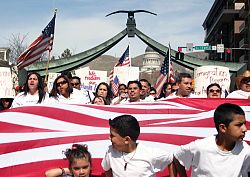Immigration reform means justice, not amnesty

Once again a window of opportunity is opening in our country, an opportunity called Comprehensive Immigration Reform. We came very, very close to achieving this elusive goal in June of 2007, but since then our federal government has declined to act on the issue. Now, however, the political winds are shifting once again and immigration reform seems to be within reach. This possibility of reform is certainly good news for our country and for those who have been longing to make our country their home. The United States Conference of Catholic Bishops has long championed immigration reform, calling for humane and just policies for the 11 million or so immigrants in our country who lack proper documentation. It appears that the bipartisan approach to immigration reform now being put forward would deal fairly with these immigrants who have been living in the shadows for so long. Nonetheless, there are still some hurdles to cross. One of them is the political hot potato called "amnesty." For many in our country, "amnesty" is a dirty word, and already some who oppose immigration reform are putting this label on what’s being proposed. However, the reform that our political officials are contemplating, which is supported by the Catholic Bishops’ Conference, is not amnesty but an earned path to legal status and possible citizenship. The undocumented immigrants who are already here in our country have been working very hard, against difficult odds, to make their way. They are not getting a free ride by any means. Furthermore, the new law would require them to pay a fine, pay back taxes, learn English, and fulfill other obligations before they would be granted legal status. This is a far cry from amnesty. These immigrants already are earning the right of legal status in our country. Their intention is to provide for their families, to avoid persecution of different types in their home country and to establish themselves as trustworthy citizens in the United States of America. Since they have been here, they have benefited us immeasurably. They put food on our tables, make our beds and build our houses. I believe that most reasonable observers, looking at undocumented immigrants from this point of view, would be inclined to be generous. It is also important to remember that, in the vast majority of cases, we are not talking about hardened, violent criminals. Many of the undocumented have not committed a felony nor a misdemeanor; under the legal code, being in the U.S. without documents in most cases is a civil infraction, not a criminal act. In other words, it is about as significant as a minor traffic violation. The pejorative word "illegal" leads one to believe that we are dealing with dangerous criminals and not otherwise law-abiding and God-fearing human beings. Parenthetically, even if we were not inclined to grant legal status to the undocumented, as long as they are responding to our "help wanted" signs, the very least we should do is uphold our long-standing labor policies of fair wages and safe working conditions – protections currently denied to undocumented workers. Concerns about our country’s security are legitimate, but we have seen over and over again that enforcement-only solutions do not work. The proposed immigration reform would benefit our country’s security by encouraging people to come out of the shadows and register with the government. It would also promote family unity by preventing parents from being forcibly separated from their children. It is sad to note that just last year 98,000 parents were deported, leaving behind their sons and daughters. The time has finally come when we can adopt fair and sensible immigration laws that will meet our country’s needs as well as provide safe avenues for immigrants to come to our shores and become productive citizens. We must stop labeling our fellow human beings with pejorative terms and begin to acknowledge their God-given rights and our need for their presence to keep our economy strong and growing. Now is the time to bring about comprehensive immigration reform. One final thought for those who oppose this positive step in dealing with one of the most pressing issues in the U.S. today: Amnesty is not a bad word. I thank God every day that he granted me amnesty through the suffering death and resurrection of his only Son. Personally, I would have no problem granting amnesty to those undocumented immigrants in our midst who have worked so hard and so long to enjoy the freedoms we often take for granted. But I won’t call it that. Instead, I’ll call it justice, a justice that can only be brought about by finally passing comprehensive immigration reform.
© Copyright 2024 The Diocese of Salt Lake City. All rights reserved.

Stay Connected With Us